|
[music, albums] January 27, 2005 at 7:52:00 PM CET
XV: 1979 Joy Division - Unknown Pleasures, pt. 1 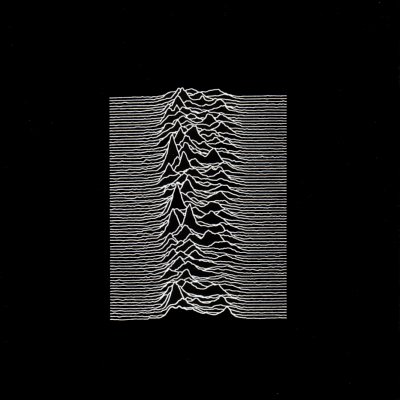
Everything has been said about this album already, I can only reiterate that you should forget it all and listen to the music. It is rewarding on its own. And you would have missed something as a consumer of music if you hadn't listened to this album. Listened to at the right time it can be life-shattering. Some words on it in a kind of chronological order though. The first thing striking about this album is its cover. It looks like a ragged mountain range rising from the ocean. Maybe there is such a mountain range somewhere in the universe. But I don't think it has been spotted yet. It is still unknown. The cover is a reproduction of 80 (not 100, I counted them!) consecutive pulses of the first pulsar discovered in 1967, the CP1919. A pulsar is a neutron star (a star condensed to 20 km diameter or so) which is what stays of a mass-rich star after a supernova, i.e. an "implosion" of a star making it flash up like a galaxy. A pulsar emits pulses of electromagnetic waves on a regular base. The picture is often referred to as the "dying star logo". The colours have been inversed though. Originally the lines were black and the background was white. (continued here) link (one comment) ... comment [music, albums] January 17, 2005 at 9:50:00 PM CET XIV: 1997 Robert Wyatt - Shleep 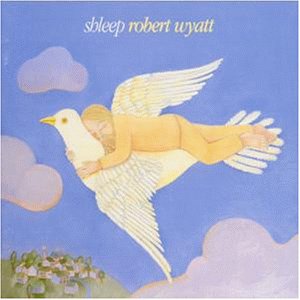
I had forgotten how otherworldly beautiful this record was until I relistened to it (and the other ten contenders of the 1997 poll) on our last eleven hour car trip to Perpignan before Christmas. In a closed place like a car you are really forced to listen to the music, you can't escape. I came up with a simple system of how to rate an album. Just giving a point for each song I like and then adding them up. Shleep got 10/11. This was Robert Wyatt's first record after the end of 18 years of Tory government. It is a more personal and less outwardly political record than his releases during the Thatcher/Major era. The main theme is insomnia, feverish insomnia to be precise which he suffered from after 1991's Dondestan. Alfreda Benge's (his wife) phantasmagoric cover shows him having defeated both that illness and his paraplegia. He is slumbering on an oversized dove flying above the clouds. The record starts with the grooving minimal pop song Heaps of Sheeps produced by Brian Eno. Eno provides synthesizer magic and background chorus voice and makes this sound like a song from one of his first two solo albums. The lyrics explain the record title. Wyatt sings on the futile try to count sheeps to fall asleep. The counted sheep jump over a fence but stay there and produce a sheep jam so that they come back and have to be recounted. The stubborn sheep refuse to be instrumentalised as a sleeping aid. Absurd but ingenious. There is no transition to the next song, The Duchess. A musical U-turn. Everything slows down. From a looping motion picture to an acoustic image with sax improv by free-jazzer Evan Parker. The paradoxical punning lyrics are a declaration of love to Alfreda: Oh my wife is tall and short,
she won't do what she ought.
She never lies, but then again,
she lies down all day long.
The next track Maryan takes the last bit of haste out of the music. We have arrived in epic cinemascope dream land. Philip Catherine's acoustic guitar constitutes the harmonic base, Chikako Sato gives some shading with her violin, Wyatt sings about the path of a salmon mounting back the river to the source, Nayram (=Maryan in reverse). Just a guess. Could Maryan be his mother? The transition to Was a Friend is a sample of an Austrian band doing a Wyatt tribute. Musically the song itself sounds like a waking-up within the flow of the record. With lots of gorgeous trumpet improvisation by Wyatt. Though its subject is a dream. On meeting an old friend again. The song is signed Wyatt/Hopper so I think it is about Free Will and Testament is a measured philosophical contemplation on self-referential existential questions with Paul Weller doing the reserved but enveloping rock guitars: Had I been free, I could have chosen not to be me.
Demented forces push me madly round a treadmill
Demented forces push me madly round a treadmill
Let me off please, I am so tired
.
It goes on with September the Ninth, a jazzy trombone-soaked ballad with a long instrumental intro on a flying woman whose arms the swallows accept as wings. Evan Parker adds the sax improv touch again. The keyboard-dominated Alien is the song coming closest to the cover image: I sleep on the wing
Above the rainclouds
The world rhythm is provided by Gary Azucx wonderful djembe. The atmosphere gets proggy when Phil Manzanera's guitar joins in at half-time. Chucho Merchan's bass provides some great licks. Finally Robert Wyatt's voice which is as airy, angelic, asexual, androgynous and all-encompassing as it can get does make this the stand-out track of the album. Out of Season is a sketch on bird watching. A long 17+ syllables haiku on a young sparrow bathing next to the mail box. How I love that complementary marriage of trombone and trumpet. Impressionism at its best. A Sunday in Madrid is the song I like least on the album. A long spoken word report on a visit to Madrid. Too long. Blues in Bob minor is Robert's version of Bob major's Subterranean Homesick Blues. Where the weatherman becomes a weather girl. Much more upbeat, much more danceable. Best cover ever. Apparently Wyatt forgot the words of the original, wanted to sing some repetitive lines and his wife said no. So he reinvented and improved the original. A true original this man. Then comes The Whole Point of No Return. Like a Tibetan monk choir humming something in the spirit of "Om". There is no better way to finish this album. Further reading:
Here is the overview of the series 40 years, 40 albums of which part XIV was this post. link (4 comments) ... comment [music, albums] December 23, 2004 at 7:20:00 PM CET XIII: 1971 Joni Mitchell - Blue 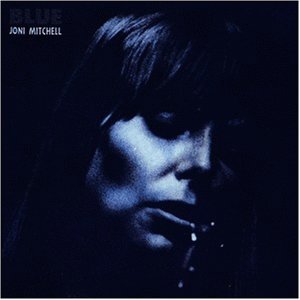 It is only for the third time in this series after the banana album and Amnesiac that you and me have chosen the same album. Joni Mitchell’s terrific Blue. Ten confessional songs of a simple beauty and intense directness like few others in my discotheque. Where Joni does a strip-tease of her soul. On the dvd Woman of Heart and Mind she talks about her influences. The crooners of the 40’s who had gorgeous tunes but shallow lyrics and Bob Dylan who wrote poetic lyrics but whose songs often lacked in melody. She melded the good parts of these two. Singing from the perspective of a sensitive young woman with a soft spot for romance she created her own very personal style. A short song by song account with excerpts of her lyrics.
It is only for the third time in this series after the banana album and Amnesiac that you and me have chosen the same album. Joni Mitchell’s terrific Blue. Ten confessional songs of a simple beauty and intense directness like few others in my discotheque. Where Joni does a strip-tease of her soul. On the dvd Woman of Heart and Mind she talks about her influences. The crooners of the 40’s who had gorgeous tunes but shallow lyrics and Bob Dylan who wrote poetic lyrics but whose songs often lacked in melody. She melded the good parts of these two. Singing from the perspective of a sensitive young woman with a soft spot for romance she created her own very personal style. A short song by song account with excerpts of her lyrics.
All I Want Do you see – do you see – do you see
how you hurt me baby
So I hurt you too
then we both get so blue
From the beginning on Joni makes it clear that she is a woman who is going her own way. Already in the upbeat starter All I Want (what a revealing title) Joni sings about the two themes which have been dominant through most of her (early) records. Independence and love. She travels to find herself and falls in love to lose herself in the other. And vice versa. Most of her songs are about the difficult task to reconcile these two opposing movements. My Old Man But when he’s gone
Me and them lonesome blues collide
The bed’s too big
The frying pan’s too wide
A sweet love song praising her lover in tender words. This is a piano ballad encapsulating the melancholic mood of Blue. It is quite telling that her strongest and most impressive images in this song describe separation. Little Green Born with the moon in cancer
Choose her a name she will answer to
Call her green and the winters cannot fade her
Call her green for the children who have made her
One of the most touching songs on the album. It is the only one which Joni composed long before Blue in 1967. She sings about the daughter she had when still very young whom she didn’t raise herself. There was a happy-end when both met a couple of years ago via the internet. Joni found out that she was a grand-mother. Carey Come on down to the Mermaid Café
and I will buy you a bottle of wine
And we’ll laugh and toast to nothing
and smash our empty glasses down
Not my favourite song on Blue. Joni has got this high-pitch girl’s voice like on earlier records. When she reaches the high notes to my ears her singing is almost unbearable. The song is an account of a trip to Europe. She even has been to the famous Matala beach at the South coast of Crete where the hippies lived in a commune in the caves at the end of the 60’s. Blue You can make it through these waves
Acid, booze and ass
Needles, guns and grass
Lots of laughs, lots of laughs
The way she stretches the one syllable of the word blue probably is my favourite moment on the record: "Bloo-hoo-hoo-hoo-hoo". Really stressing the dark primal undertone of the vowel "u". The blues deep inside her emerges at the surface and the feeling is extended to a maximum time length. At the same time I also get the impression that Joni is expelling the mean bad spirits here. California Still a lot of lands to see
But I wouldn’t want to stay here
It’s too old and cold and settled in its ways here
Immediately after the sombre Blue we have the bright and sunny California. What a great contrast. Joni is still traveling around Europe (Is she the mother of Rumsfeld's infamous "old Europe" remark?). But she is kind of homesick and dreams about coming back to her adopted home, the warm and easy-going California. Amazing how her enthusiasm about something far away can catalyse such a light groovy song. This Flight Tonight You got the touch so gentle and sweet
But you’ve got that look so critical
This song I first heard in the version of 70’s rockers Nazareth. Another upbeat tune which is quite untypical for Joni as it is rather hard-rocking. I somehow never really warmed up to this one. The lyrics are great as usual and speak of a flight which disconnects her physically from her lover but inspires her to think of him and to come close to him in mind. River I’m so hard to handle
I’m selfish and I’m sad
Now I’ve gone and lost the best baby
That I ever had
"The river to skate away on" is a typical image for Joni. As a Canadian she obviously skated a lot in her youth. The frozen river is like a road. A means to escape from lovesickness. On the other hand Joni is very honest and realistic here. She knows that she is not easy. Looking at her statements in interviews in the last couple of years where she is often extremely full of herself only confirms her difficult character. Music wise this ballad is at the border of schmaltz. I have difficulties appreciating it these days but that’s maybe because I have listened to it too many times. Oh you are in my blood like holy wine
You taste so bitter and so sweet
Oh, I could drink a case of you, darling
And I would still be on my feet
One of the best songs of all time. A simple tune with a chorus which still knocks me down. The mystery of love condensed into four lines. Just a sip of this musical magic potion makes me dizzy. On the Woman of Heart and Mind dvd Joni performs the song on dulcimer. It sounds like an old Appalachian folk tune sung by an innocent and untouchable fairy queen. The Last Time I Saw Richard The last time I saw Richard was Detroit in ’68,
and he told me all romantics meet the same fate someday
cynical and drunk and boring someone in some dark café
This has always been my song on Blue. During my first year of English in the 5th class every pupil had to choose an English surname by which he/she was called in the English lessons. I chose Richard. But that is just a footnote. The disillusioning story of a dreamer called Richard Joni sings about here has always impressed me because of its psychological realism. Do I have to mention that I saw certain parallels to my student life and that this song seemed like a prophecy of my future? Further reading:
Here is the overview of the series 40 years, 40 albums of which part XIII was this post. link (2 comments) ... comment [music, albums] December 13, 2004 at 10:03:00 PM CET XII: 1970 Neil Young - After the Gold Rush 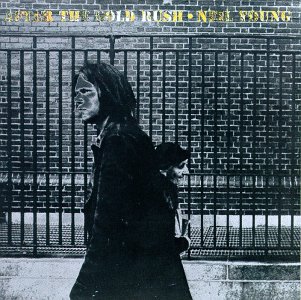
1970, what a phantastic year in music. August: The last official Velvet Underground album Loaded which treads similar country-rock grounds as my choice from September: Neil Young's third long play, After the Gold Rush. October: Robert Wyatt's almost overlooked debut The End of an Ear. Crazy experimental free-style jazz rock. Much more exciting than anything I have ever heard of Soft Machine. Maybe his best album. December: Plastic Ono Band, John Lennon's primal scream therapy to cope with his parents' trauma. And Captain Beefheart's delta blues meets avant-garde record Lick My Decals Off, Baby which is a lot easier to digest than his previous outing, the mythic Trout Mask Replica. Why did I choose the rather conventional Neil Young album? The main reason is that I have a personal relation to it which I don't have to the others. It was the record which comforted me after my first girl-friend had left me. I was disappointed in the beginning as it seemed so average but at the same time I discovered Neil Young. Whose feeble womanish voice I had detested before. Who taught me to never trust my first impression. And gave me back my belief in the power of innocence, the incredible strength of showing your own vulnerability to the world. 35 minutes and 15 seconds. A perfect length for an album. Every song a hitter. The whole Neil Young is here in a nutshell. The definite statement on the flower-power thing of the sixties. The gold rush is over. The rednecks are still there. Southern Man as a precursor of the godly Cortez the Killer. The American dream is based on a nightmare. "Tell me lies later." Forget politics. It all comes back to love, the strongest poison and medicine of all (Joni Mitchell)
Only Love Can Break Your Heart. The 90's band Saint Etienne had one good song, a cover of this. To finish this embarrassing post off. A link to the gorgeous starter Tell Me Why. By the way the last song Cripple Creek Ferry closes this gem of a songwriter album like a cheese closes a great meal. It lingers on for a good while in your eardrums. Further reading: a discussion on the meaning of the lyrics of the title song. Here is the overview of the series 40 years, 40 albums of which part XII was this post. link (3 comments) ... comment [music, albums] December 6, 2004 at 8:37:00 PM CET Harold Budd calls it quits as he has nothing more to say Budd's music has the effect of extending the moment just before you fall into a deep sleep when your brain is dreaming but your body is awake.
His last album is Avalon Sutra (bbc, stylus reviews). I only got into Budd this year (The Plateaux of Mirror) and then he stops making music. Bad luck. There are one minute samples of all 14 tracks of the new album over here (click on "Catalogue" and then "Harold Budd Avalon Sutra"). I love this kind of daydreaming music. Apparently the CD can be ordered online here (the German Amazon hasn't got it). link (no comments) ... comment [music, albums] December 5, 2004 at 5:49:00 PM CET XI: 1991 Smashing Pumpkins - Gish 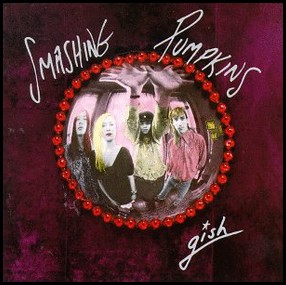
1991 was the year I seriously got into indie rock. There are at least 65 releases (almost all are albums) of that year in my discotheque. Before starting the poll I was pretty sure to choose My Blood Valentine's noise pop classic Loveless as my fave. On Friday I relistened to it and there were exactly two tracks which stood the test of time: When You Sleep and the closer Soon. The rest was totally forgettable badly aged hoover in reverse gear experimentalism. Groundbreaking in 1991 but sucking big time in retrospect today. The next contender for number one were The Field Mice. I was rather close to go for their version of very personal romantic indie pop with gorgeous melodies and grooves but their album from 1991 Coastal (all songs being on their later sampler Where'd You learn to Kiss That Way which featured in the poll) has some tracks with drum-machine (that's a definite no-no concerning the music I appreciate) in it and is not as consistent as the album I finally chose: The Smashing Pumpkins (and Butch Vig's as a producer) debut Gish. An album of an almost frightening intensity and coherence which somehow got both overshadowed by Butch Vig's next slicker production, i.e. Nirvana's Nevermind and the subsequent releases of the Pumpkins. Of which only the double album Mellon Collie and the Infinite Sadness was noteworthy. Gish is the only heavy metal album which ever did anything for me. If it is a heavy metal album. It is a very eclectic work also integrating psychedelics, goth and some of the most mesmerising drumming I have ever heard. Jimmy Chamberlin, the oldest member of the band (born 1964) who arrived latest and got kicked out later for his heroine addiction came from jazz. Corgan's father was a jazz guitarist. Maybe these jazz roots make the difference. I really don't know. All I know is that this album is extremely varied and timeless. The coherence is two fold. There is a coherence of the album (an unmatched flow of indispensable songs) and a coherence of the band. The interplay of shaman drums, lead playing bass and distorting guitars is absolutely somnambulistic. Everything is extremely tight and fluid at the same time. Even Corgan's voice which can grate fits in perfectly. I used to listen to this album on headphones after a night out. Going on a mind trip after the real life trip. Impossible to put into words like most of these kind of trips. Maybe the lyrics of Crush can give an idea of this experience: you wrap your arms around
a feeling that surrounds
like liquid peppermint
Refreshing like a hot hyper-sweet peppermint tea served from a Moroccan tin tea kettle in the sahara. The taster is Rhinoceros (lyrics) which starts slowly but soon turns into a guitar feedback drenched orgy. Here is the overview of the series 40 years, 40 albums of which part XI was this post. link (5 comments) ... comment [music, albums] December 1, 2004 at 9:05:00 PM CET Three albums I have listened to once and am definitely too harsh with ('cept the last) Giant Sand's latest It's All Over the Map may be his 37th(?) album. Maybe the 25th including the solo albums and the albums under a different monicker I got. Probably the last. As it is the same unfocussed hodgepodge mess between improv, desert rock and Howe as usual but without the inspiration. Convertino and Burns have left and Howe is with some Danish friends plus Vic Chesnutt, John Parish and who knows whom. I hope he hasn't lost it for good. The first Go-Betweens Send Me a Lullaby is not easy to get into neither. It has been re-released with a bonus disc. They haven't found their sound yet. I hear a band who has listened to the Talking Heads but is doing their own garage thing. Loveable dilettants. The new David Thomas & two pale boys 18 Monkeys on a Dead Man's Chest is killer. A voice from another galaxy. Hardly any drums. A trumpet in the distance. A slow motion descent into the darkness. Going where no-one has been before. To one of those places I am attracted to. link (2 comments) ... comment [music, albums] November 27, 2004 at 12:57:00 PM CET X: 1984 Lloyd Cole & the Commotions - Rattlesnakes 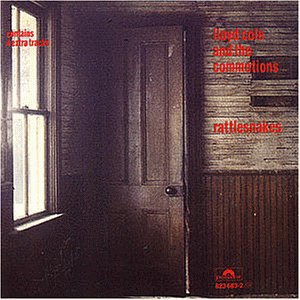
When I set up the reader’s poll for 1984 I was almost 100% sure which album I’d pick as my fave of the Orwell year. Hatful of Hollow, the second LP of The Smiths which established them as the most important band of the mid eighties. The poll even confirmed this choice but after relistening to the other contenders I came to a different conclusion. Guitar pop it had to be but neither Morrissey/Marr nor Forster/McLennan (Go-Betweens) could match the team of singer/songwriter Lloyd Cole and guitarist Neil Clark. Rattlesnakes, the debut of Lloyd Cole & the Commotions sounds as fresh and infectious today as 20 years ago. Lloyd Cole’s erudite lyrics on achy experiences with the other sex may not attain Morrissey’s witty imaginative songs on adolescence but altogether Rattlesnakes is more of a piece than The Smiths "garage" album. On the inside photo the four members of the Commotions and Lloyd Cole are grouped around a living room table. They all smile except him. He stands in the corner behind the others and stares straight into the camera with an emotionless serious face. Somehow he seems to be totally out of place. At the time he was 23 years old and had studied philosophy at Glasgow university. He shows his literacy in arts and letters in his songs full of allusions to books, movies and music. On Rattlesnakes he namedrops the writers Simone de Beauvoir, Truman Capote and Norman Mailer, the actresses Greta Garbo, Eva Marie Saint and Grace Kelly and the musicians Leonard Cohen and Artur Lee. It is all too much showing off but you have to forgive him immediately when you hear him sing. Lloyd Cole has got the voice of a crooner. It is at the same time masculine and sensual, camp and soulful. His sugar-sweet tunes go straight into the heart. Neil Clark plays his stratocaster extremely fluently. It goes down as well as a Bourbon on the rocks. The ten songs on the original LP clock in at just above 35 minutes and there is not one dud. There is an instant nostalgic feel to the cosy British winter afternoon atmosphere of the music. The occasional string arrangements even add a little melodrama to the sentimental mood. Lloyd Cole is a romantic who does not take himself too seriously. I love the self-irony in lines like It wasn’t my style to find surf in my eye
It was much more my style to get sand kicked in my eye
All in all this set of catchy acoustic pop songs is like a cooler, less kitschy version of Neil Young’s Harvest. Without the occasionally painful plainness but with much more self-confidence. It was going to stay Lloyd Cole’s masterpiece. He had two great records in the 90’s Don’t Get Weird On Me, Babe and Love Story but he never repeated the stroke of genius of his first release. There is a special 20 years anniversary edition of Rattlesnakes with a bonus disc out this year but I guess the Polydor release with the four bonus tracks and the extended version of the centerpiece Forest Fire is probably still the one to look for. Especially when you look at the price tags (about 7 against 17 euros). The last bonus track, the upbeat You Will Never Be No Good can give you a good idea of the jangly guitar sound of the album. Further reading: Here is the overview of the series 40 years, 40 albums of which part X was this post.link (no comments) ... comment [music, albums] November 22, 2004 at 9:02:00 PM CET IX: 1994 Swell - 41  In the door, up the stairs
In the door, up the stairs
The poll In the reader's poll it was a draw between Portishead's first Dummy and Nirvana's last Unplugged. Both of those albums gave me the chills when they came out. But somehow they didn't stand the slightest chance against the chef d'œuvre of one of the most original eclectic bands of the 90's. Number mysticism I am 41 years old now. 41 is also my minimal pulse. When you rotate the digits in 1994 by one position you get 4199. 41 is the title of Swell's third record. Named after the address of the warehouse where they recorded this album (and the two before) in San Francisco. 41, Turk Street in the sleazy Tenderloin district. Chez Swell The record is constructed as an aural visit to this place. It starts with some street noises. Then we hear a key turning in the lock, the main door opening and being slammed. Someone is going up the stairs. The door of the room is open and there is a faint rising guitar sound which becomes the melody of the first song, Is that Important?. A slow adequate introduction into the captivating world of David Freel (guitars), Sean Kirkpatrick (drums) and Monte Vallier (bass) who called themselves ironically Swell. Like a husband says "oh that's swell" when his wife announces that his mother-in-law is about to come. Nirvana went nowhere. Where did Swell go? In a way they anticipated their commercial failure with this name. John Peel invited them to a BBC session and called them the next big thing after Nirvana and Pavement. 41 was their first album on a major (Warner) but the label prevented them from ever getting big by not releasing their next record. There is a song on 41 I wrote about before called Don't Give having a ringing phone in it which nobody ever picks up. It is like a metaphor for their successlessness. Maybe this was the call which would have settled everything. But they didn't answer it. Instead they made great mesmerizing music around a phone ringing in vain. What is so special about Swell? I think it is the guitars. There is an acoustic folky guitar playing the sunny hook lines and a noisy fuzzy electric guitar in a Jesus & Mary Chain vein creating the dark undertow. Those two guitars blend the two sides of San Francisco. The mild warm climate and the fog obstructing the light. Or the laid-back and easy going way of life and the gloomy world of drug abuse and criminality. There are a lot of other characteristics which contribute to their dense sound. Kirkpatrick's restrained precise but powerful way of drumming, David Freel's cool dry baritone, Monte Vallier's jazzy way of playing the bass, the intimate room atmosphere coming from the lo-fi recording technique and their use of long pauses to augment the tension of the songs. Genealogical music tree There is a lot of different music Swell have integrated into their trippy sound. Joy Division for the occasionally menacing ambiance. Dream Syndicate for the psychedelic guitars. The languid dreaminess of Mazzy Star for whom they opened at their first gig in San Francicso. A bit of the Weltschmerz of Mark Eitzel's local American Music Club. Plus a dash of Ennio Morricone's lush ambient western soundtracks. Going underground It all finishes with the guy leaving the room going down the stairs and going outside. He buys a ticket for the subway, takes it and an old guy reads all the lyrics while you hear the doors of the train opening and closing every minute or so. We are back in real life after an hallucinating visit to the rehearsal room of one of the most unique sounding bands of the 90's in the most beautiful city of the world. Here is the overview of the series 40 years, 40 albums of which part IX was this post. Further links:
link (no comments) ... comment [music, albums] November 16, 2004 at 11:30:00 PM CET VIII: 1976 Keith Jarrett - Sun Bear Concerts 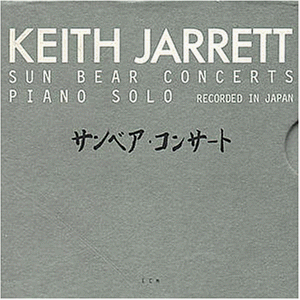
Ask me about the ten records I'd take to the notorious island, give me ten seconds and because of insufficient time to seriously think about the answer I will say the five improvised piano solo concerts Keith Jarrett gave in Japan in November 1976 (actually ECM recorded 8 gigs but released only 5). I got those records more than 25 years ago and listened to them more than to any other music in my life. Especially during the last three years of my school days. The sun bear is the smallest bear. It lives in East Asian woods and "is often tamed as a pet when young but can become bad tempered and dangerous as an adult" (Encyclopedia Britannica '81). Taking Jarrett's character and temperament into consideration it doesn't really come as a surprise that he liked to call his giant live album box after this little "grizzly" from the East. Jarrett is known to be a rather difficult performer especially when improvising on his own. He aborted several concerts in the 70s as the audience didn't keep quiet and disturbed his trance-like concentration. Fortunately this didn't happen with the attentive Japanese listeners on his tour in November 1976. They participated in the creation of possibly the most eclectic and transcendental performances in the history of improvised piano music by just staying perfectly silent until the end. Why is this thing about the audience being in total awe and almost erasing itself so important? It has to do with the fact that Jarrett is only the medium, the vessel, the instrument. It is not him playing. It his him being played. He is driven by something greater than himself. There are classical echoes of Schumann, Chopin, Satie and Ravel, there is jazz like e.g. Cecil Taylor and there is a force fusing all this into a unique musical cosmos. Jarrett empties himself completely before a concert. He lets loose and sees what happens. Sometimes it works, sometimes it doesn't. When it does work like in the Sun Bear Concerts, it is like watching a couple making sex. Jarrett starts slowly, often with a leitmotiv, accelerates, passes a cacophonic desert, accompanies it with a lot of groaning and comes to a first melodic climax around 15' into the concert. The piano and its player become one. I never met anybody who possessed those records. I am not sure how important it was for me that this music did not get shoved in my ears. There is something about discovering music totally on your own. Maybe that is the only music in which you really feel at home. Ich fühle mich aufgehoben in Keith Jarrett's Anschlag, in seinen Pianotrips. It is still great that I can almost anticipate every tone in these close to seven hours of piano heaven and hell. I hope reading this post won't turn off anyone of discovering Keith Jarrett. I never listened to the Sun Bear Concerts on headphones, I think. The music needs space. It has always been a great inspiration to me as background music triggering my phantasy. To write romantic love letters in my adolescence e.g. There is one image I can't forget. After school I had left Germany for good (I thought) and my parents were looking for me. Of course they also asked my only friend about my future plans. No idea what he said but he stayed one evening in my room and listened to these records. Going on a brain trip on our mutual music drug while I was on another, a real trip. It is difficult to say which are my faves here. Maybe Kyoto (the 1st concert) and Nagoya which finishes weirdly with an ostinato becoming softer. Sapporo used to be my beloved one but I loved it to death. It is the easiest (most melodic) and closest to the Köln Concert. Osaka is pretty much perfect. Tokyo has some very disharmonic passages but is phantastic as well. These concerts are almost too long to listen to them from start to finish. I have been used to listen to them on vinyl and changing the sides three times. On CD I am almost forced to listen to each concert in one sitting though the CD as a medium was too short for three of the five concerts (haha). As the encores didn't fit and had to be put on an extra disc. Here is the overview of the series 40 years, 40 albums of which part VIII was this post. link (4 comments) ... comment |
last updated: 9/25/24, 10:42 PM subscribers: 390 contact: alex63 at bigfoot dot com 40 years, 40 albums why this is called close your eyes some photos Youre not logged in ... Login
XXVIII: 1998 Cat Power - Moon Pix The other albums Most people voted for Massive Attack's Mezzanine in the poll. ... by alex63 @ 9/25/24, 10:42 PM Tom Liwa - Im Tal der nackten Männer (Lyrics) Es war ein weiter Weg Den Kaiserberg runter bis zu dir Mit Sternen in ... by alex63 @ 8/14/24, 5:16 PM ...
Hier geht es weiter. Schon mehr oder weniger seit über 10 Jahren... by alex63 @ 12/8/21, 5:41 PM ...
Der Schachchamp hieß entweder Miguel oder evtl. Manuel. Es gab noch eine ... by alex63 @ 2/23/21, 8:55 AM mp3 blogs/rotation etc. Update: The most useful site in this category is the mp3 blog ... by alex63 @ 1/26/20, 12:23 PM ...
du hast recht, die angeblichen lifetime forward mailadressen von bigfoot wurden irgendwann ... by alex63 @ 12/20/19, 11:23 PM
03/02 GIANT SAND, F, Brotfabrik............. .
music (EN)
--------------- aloof from inspiration an aquarium drunkard the art of noise NEW aurgasm the blue in the air bradley's almanac destination out disquiet dissensus dj martian egg city radio eyes that can see in the dark fingertips i love music an idiot's guide to dreaming k-punk largehearted boy leonard's lair misha4music moistworks motel de moka musicophilia one faint deluded smile organissimo jazz forums the perfumed garden said the gramophone silence is a rhythm too stereogum swens blog utopian turtletop vain, selfish & lazy vinyl mine warped reality wordsandmusic music (DE, FR) -------------------- la blogothèque euroranch hinternet machtdose le musterkoffer musikstrom satt.org: musik schallplattenmann die zeit - musik other (EN) --------------- josh blog open chess diary orbis quintus the ringdahl family NEW time4time wood s lot other (DE) --------------- ahoi polloi bahnchaos NEU bloggold NEU cargo NEU chill daily ivy dichtheit und wahrung einschicht etc.pp. filmtagebuch goncourt's blog herdentrieb hotel mama (i think) he was a journalist jacks blog NEU ligne claire malorama meine kleine stadt mek wito passantin passe.par.tout pêle-mêle dans ma tête private collection reisenotizen aus der realität schachblätter schachblog der schachneurotiker with or without words... x.antville blog bardo --------------- the absintheur's journal brain farts buked & scorned dd denkt laut ja zu aa the mystical beast ohrzucker sofa. rites de passage sound of the suburbs spoilt victorian child three hundred bars yo, ivanhoe 
|
|||||||||||||||||||||||||||||||||||||||||||||||||||||||||||